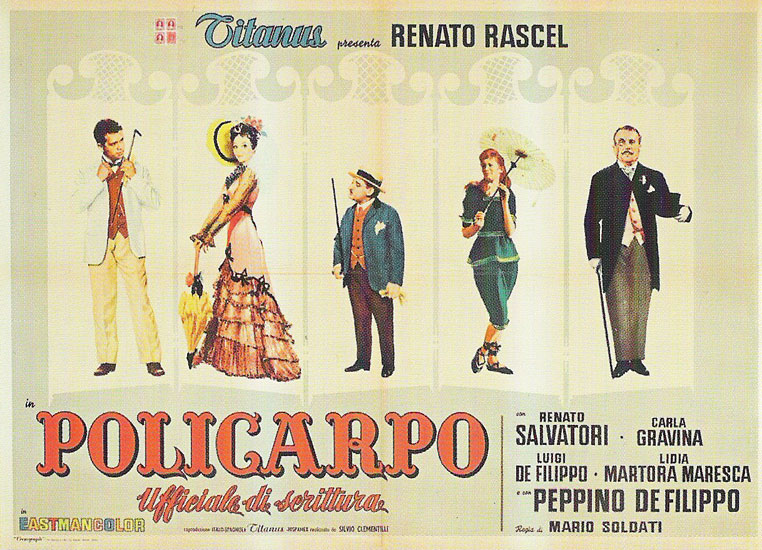The final chapter in the great cinematographic career of Mario Soldati, one of the most important Italian culture figures of the 20th century
A combination of impeccable historical reconstruction and the scathing insight that characterised the best of the commedia all’italiana genre
Renato Rascel in one of his most complex roles
One final cinematic offering from Mario Soldati, one of the most inspired and deeply reflective figures of Italian culture of the last century. Even if the film is set at the beginning of the 20th century, for Soldati it is essentially a return to his beloved 19th century, which he had stylishly explored almost twenty years earlier (Piccolo mondo antico, Malombra). However, Policarpo, is not just a delightful period piece veined with nostalgia and enriched by a remarkable attention to detail, is it also an incredibly rich portrait of an individual nuanced with tenderness and meanness, worthy of the best imitations found in the commedia all’italiana genre, but transported back in time to an era where the profession of calligraphist still existed. Soldati must share a lot of the credit for this with Age & Scarpelli, the most scathing screenwriters of Italian comedy, with Giuseppe Rotunno for his splendid colour photography, and with Piero Tosi for his impeccable costumes. And naturally, with Renato Rascel, who is outstanding in one of his most complex roles. The film is also a veritable parade of cameos: Renato Salvatori, Peppino De Filippo, Vittorio De Sica, Amedeo Nazzari, Alberto Sordi and Ugo Tognazzi, are just some of the great actors who leave their mark on the film.
The beginning of the last century. Policarpo, a man of very modest means who works as a calligraphist at the ministry, dreams of a big wedding for his daughter Celeste. She is being courted by Gegè, Policarpo’s office manager’s son. However his superior isn’t of the same opinion: he considers the beautiful Celeste’s background too humble for his offspring, and reaches an agreement with a cabaret singer to distract his son. Celeste, completely indifferent to the charms of the well-off dandy, instead gets engaged to the honest and hard-working Mario, to the initial chagrin of her father.
The final chapter in the great cinematographic career of Mario Soldati, one of the most important Italian culture figures of the 20th century
A combination of impeccable historical reconstruction and the scathing insight that characterised the best of the commedia all’italiana genre
Renato Rascel in one of his most complex roles
One final cinematic offering from Mario Soldati, one of the most inspired and deeply reflective figures of Italian culture of the last century. Even if the film is set at the beginning of the 20th century, for Soldati it is essentially a return to his beloved 19th century, which he had stylishly explored almost twenty years earlier (Piccolo mondo antico, Malombra). However, Policarpo, is not just a delightful period piece veined with nostalgia and enriched by a remarkable attention to detail, is it also an incredibly rich portrait of an individual nuanced with tenderness and meanness, worthy of the best imitations found in the commedia all’italiana genre, but transported back in time to an era where the profession of calligraphist still existed. Soldati must share a lot of the credit for this with Age & Scarpelli, the most scathing screenwriters of Italian comedy, with Giuseppe Rotunno for his splendid colour photography, and with Piero Tosi for his impeccable costumes. And naturally, with Renato Rascel, who is outstanding in one of his most complex roles. The film is also a veritable parade of cameos: Renato Salvatori, Peppino De Filippo, Vittorio De Sica, Amedeo Nazzari, Alberto Sordi and Ugo Tognazzi, are just some of the great actors who leave their mark on the film.
The beginning of the last century. Policarpo, a man of very modest means who works as a calligraphist at the ministry, dreams of a big wedding for his daughter Celeste. She is being courted by Gegè, Policarpo’s office manager’s son. However his superior isn’t of the same opinion: he considers the beautiful Celeste’s background too humble for his offspring, and reaches an agreement with a cabaret singer to distract his son. Celeste, completely indifferent to the charms of the well-off dandy, instead gets engaged to the honest and hard-working Mario, to the initial chagrin of her father.

